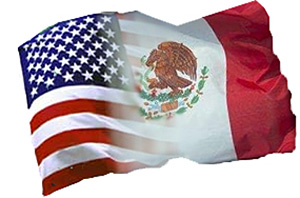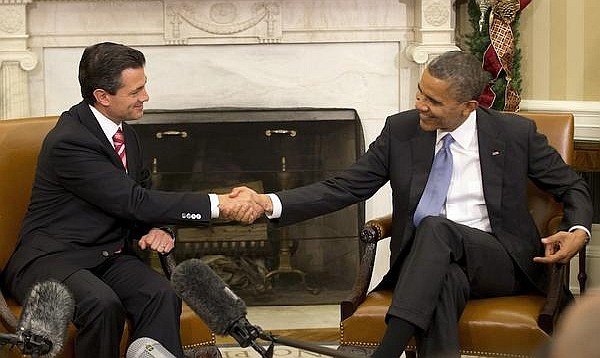Mexico City, Mexico - The date remains uncertain, but at some point Mexico’s reputation in the eyes of Americans will start to shift from being a burden – to becoming a partner as close as Canada, Japan, or Britain.
Perhaps that date is December 1, 2012.
That’s when a new president, Enrique Peña Nieto, takes office with far more political pull than recent presidents to push through the kind of reforms that have been moving Mexico closer to the United States over the past decade. He’s also taking over an economy that is fast rivaling China as a magnet for global investors.
President Obama welcomed Mr. Peña Nieto to the Oval Office on Tuesday, perhaps with an eye to raising Mexico higher in his second-term agenda. Indeed, in addition to the "pivot to Asia" that Mr. Obama recently proposed for US foreign policy, he might also pivot the United States toward its southern neighbor, which is now its third largest source of oil and second largest export destination.
 |
Few in the US have grasped the changes in Mexico. It is more open to the world - with 44 free-trade pacts and greater manufacturing exports than the rest of Latin America combined. This has forced it to listen more to its foreign critics in honoring the rule of law, labor reform, and human rights. Its politics are more competitive, its civil society and media are stronger, and its governing bodies, such as the central bank and Supreme Court, are more independent.
Mexico even seems poised under Peña Nieto’s coming six-year term to lessen the self-defeating nationalism that has prevented reform of its government-run oil monopoly. Opening Pemex to private, even foreign, investment would mark a shift from the historical Mexican resentments that have also dogged its politics. And it would help turn North America into the world’s energy giant.
One still-uncertain measure of Mexico’s changes will be in the political behavior of Peña Nieto’s Institutional Revolutionary Party. Has the PRI, which ruled from 1929 to 2000, shed its self serving ways since it lost power – and democracy bloomed?
The PRI’s comeback comes as younger Mexicans and a rising middle class are less tolerant. Mexicans have tired of the strategy of outgoing President Felipe Calderón, who relied heavily on the Army in curbing the power of the drug cartels. While homicides are down this year, the killings since 2006 have pushed Mexico to rethink this "war on drugs."
Peña Nieto plans to further beef up the federal police and improve the judiciary. He needs more US assistance for that. The PRI also holds more power in the legislature than his predecessor’s party, PAN, which allows it to better pass key reforms.
America’s interest in Mexico should also be drawn to the fact that the Mexican economy has been growing faster than that of the United States. And far fewer Mexicans are fleeing to the US for jobs.
All this argues for stronger American engagement with a nation of 113 million people on its border that is becoming a global economic player. Obama can help lead that necessary pivot.


